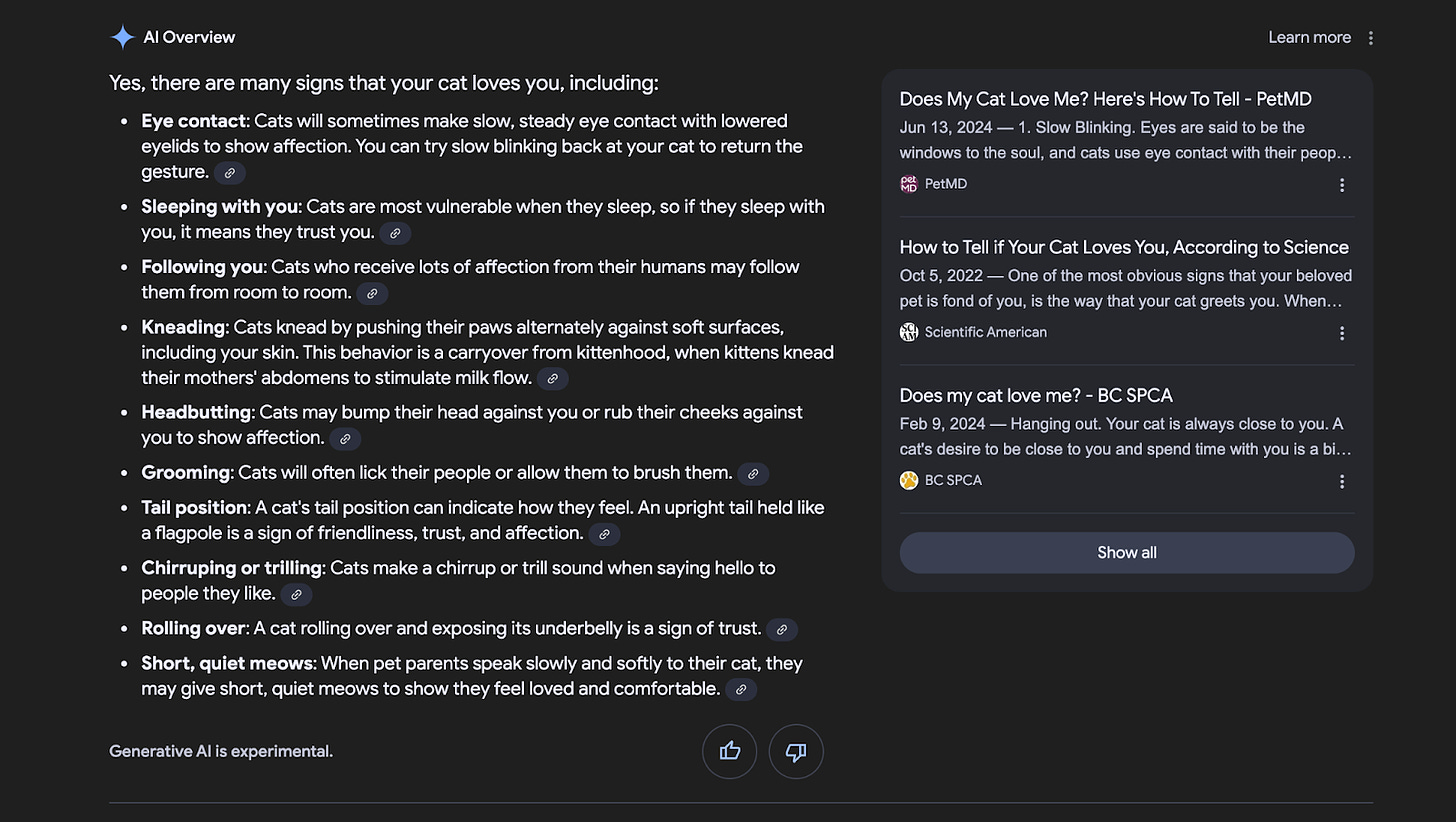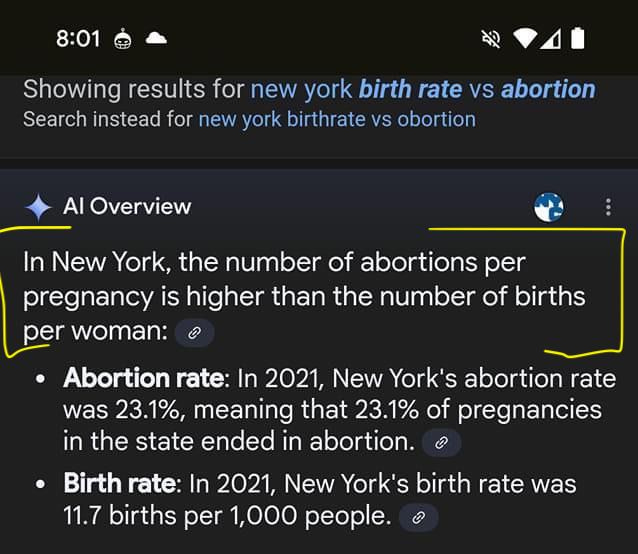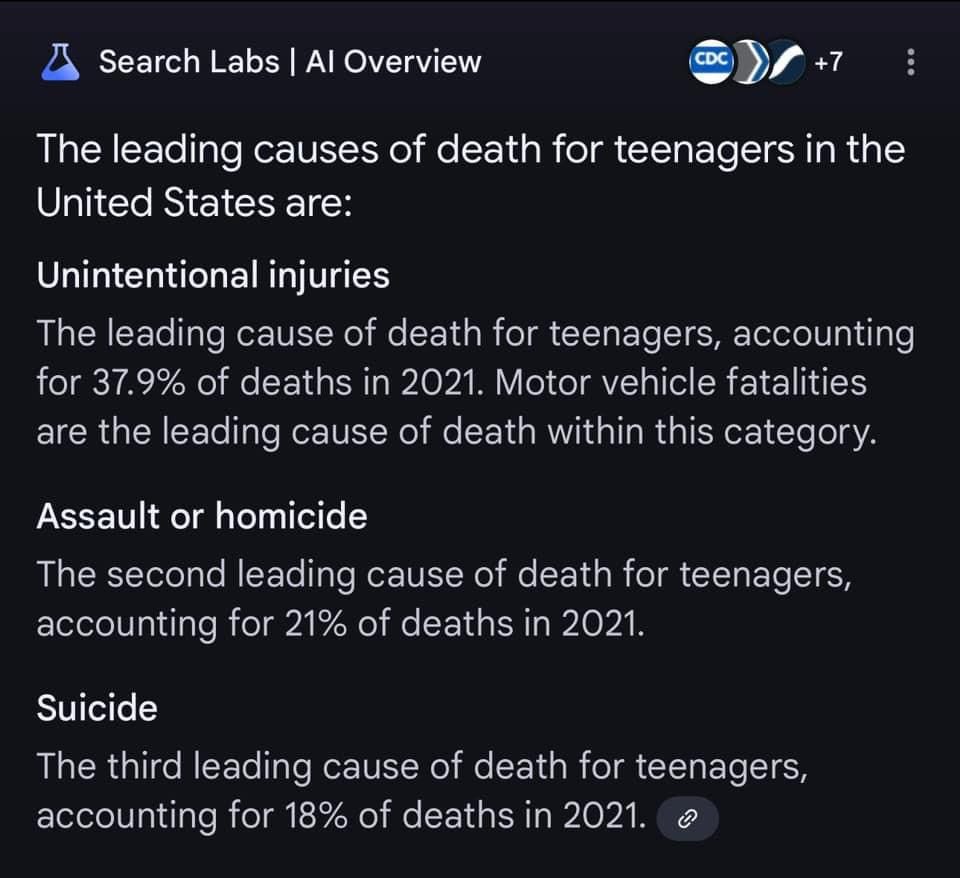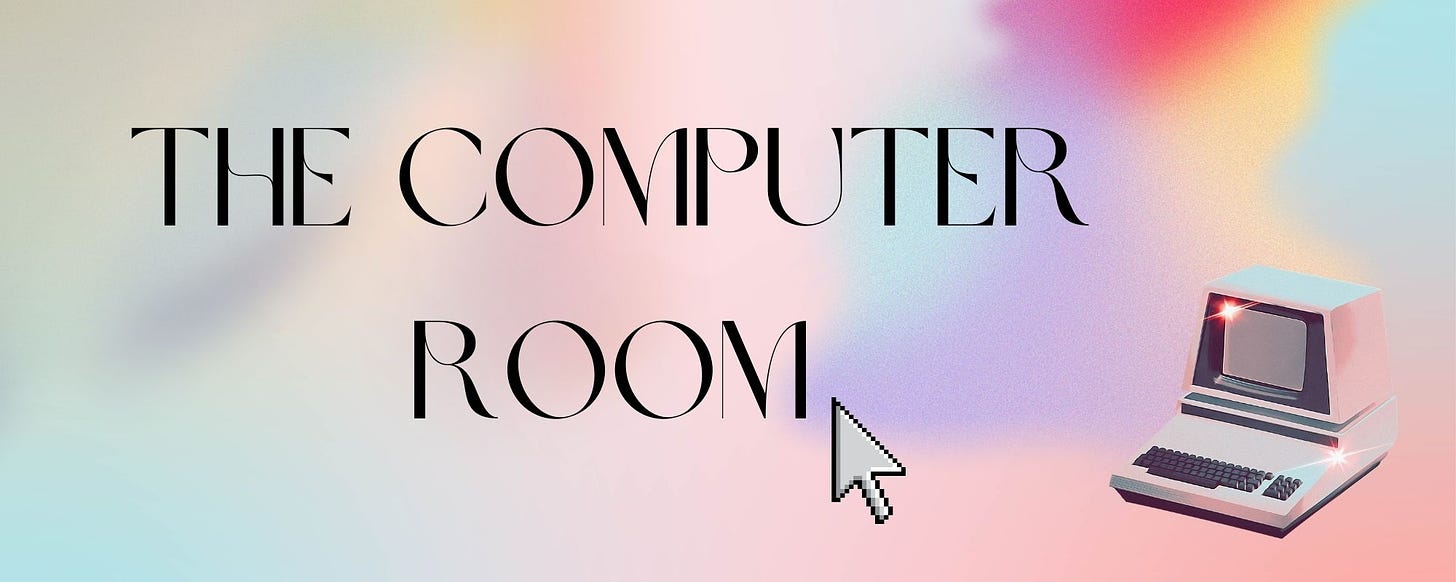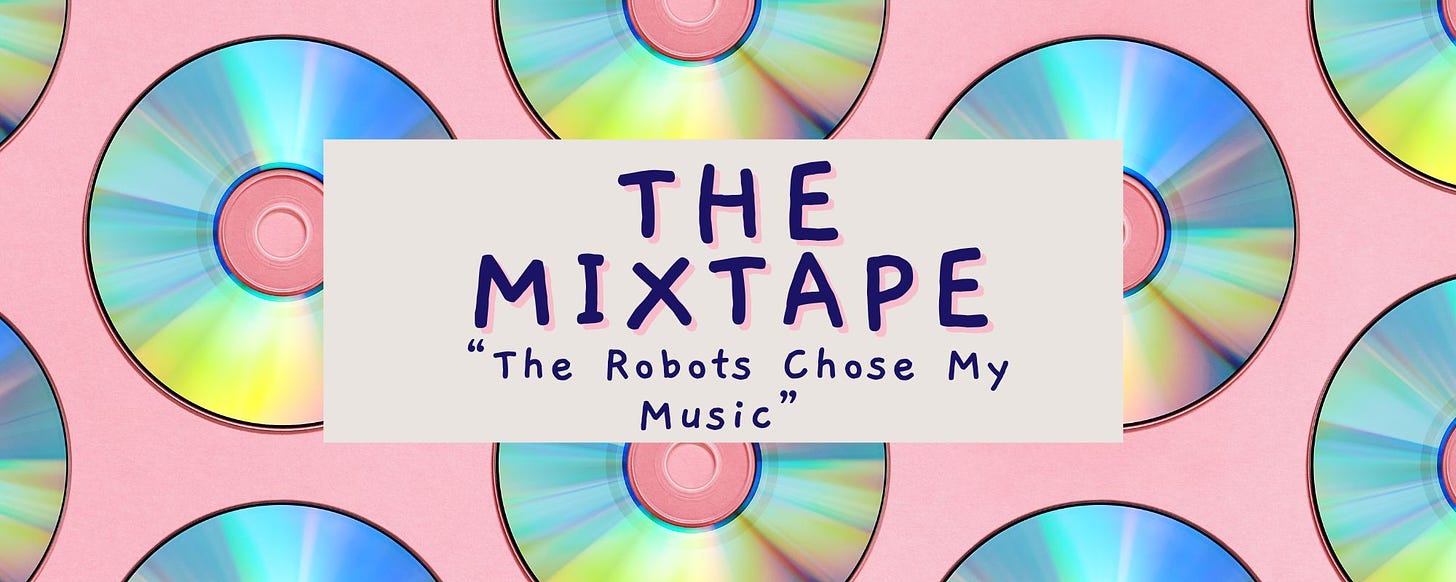Trusting the Robots (Issue #76)
Is Google’s new “AI Overview” feature making it easier to be loud and wrong on the internet?
Hi friends!
While Google hasn’t technically existed for my entire life, I don’t have a strong memory of a time when the answers I wanted were more than a few clicks away. My mom frequently teases me about my search engine habits, especially when I don’t just take her claims at face value and resort to a thorough fact-check of new information. “Why you gotta always be Googling everything?” is a phrase I’ve heard more times than I can count. But what can I say? I am who I am, and I like the facts!
But the way we get those facts? It’s changing. A few months ago, a new “AI Overview” section appeared at the top of my Google search results. The section is automatic and includes a direct answer to whatever question you’re searching. I’m sure you’ve seen it? ⬇️
As convenient as this little tool might seem, truthfully, it scares me a bit.
Look, I’m not one to think AI is evil by default. But I get where the skepticism comes from, especially when Google’s AI Overview started making bizarre mistakes right after it launched. Within days, Rhiannon Williams at MIT Technology Review was already documenting these missteps. One user reported that the tool suggested adding glue to pizza—yes, glue—and another recommended eating at least one small rock a day. The tool even claimed that former president Andrew Johnson, who died in 1875, had earned college degrees well into the next century.
Not a great look.
Google quickly responded, promising improvements. But the reality is AI Overview might never be flawless because AI itself has inherent flaws. To understand why, it’s helpful to know a bit about how this technology works. According to Wired’s Will Knight, the system relies on Gemini (a large language model) to sift through online information and offer summaries. It’s impressive, sure, but AI’s fluency can backfire —those “summaries” aren’t always accurate. But they look and sound believable, which is a scary thought when this technology can guide and shape our decisions. More alarming is that these changes are happening rapidly, often without any solid guardrails in place.
When AI Overview appears at the top of a search results page, it’s written as a factual answer to your question. There is no warning before the answers, and only after you click “show more” will you see a cautionary message like the screenshot below:
For AI to be useful, we must see it in context, fact-check it, and engage with it critically. But that’s not how most people will likely engage with a feature like this. According to HubSpot, 75% of search engine users never scroll past the first page of results (hi, it’s me 🙋🏽♀️). And if that’s true, why would we expect those same people to scroll past the AI Overview section when it seems like they have a reliable answer right there at the top?
But my concerns go deeper than blatant misinformation. I worry that shortcuts like AI Overview dampen our critical thinking. With simple summarized answers, you remove the opportunity for users to do what we used to – click around a few links, read a little here and there, and form an opinion. Instead, we’re handed conclusions on a silver platter, and that kind of convenience can easily fuel confirmation bias.
Here’s what I mean: right after I’d started brainstorming for this piece, my friend
of shared a Facebook argument she’d recently had about abortion rights. Her opponent argued against reproductive freedom, claiming that the abortion rate in states like New York was actually higher than the birth rate. A claim he backed up with the following screenshot:There was no sourcing or context; it was just an AI Overview screenshot. But here’s the problem: the phrase, “the number of abortions per pregnancy is higher than the number of births per woman,” doesn’t equate to the abortion rate exceeding the birth rate—it’s mixing different statistics altogether. Without engaged critical thinking, this kind of AI-generated summary becomes a dangerous weapon for spreading misinformation.
And I promise, this isn’t an anomaly. In another of Dani’s posts, she wrote, “Gun violence is the #1 killer of children and teens in the U.S.” Another commenter pushed back, claiming it was inaccurate, and offered the following screenshot as ‘evidence’:
Once again, there are no links to their citation, just AI Overview automated results as proof. And the information generated? It’s outdated and incorrect.
AI Overview gives internet trolls an easy way to be loud and wrong, but what about the rest of us? Most people are genuinely trying to find accurate information about day-to-day things, and they’re going to trust what Google tells them. Why wouldn’t they?? Without clear warnings, Google is creating a misinformation minefield.
My husband, Andrew, refuses to look at the AI search results “on principle,” but my feelings about it are more complicated. AI Overview cannot and will not be my only source when I need hard facts, solid research, or reliable statistics. However, not all Google searches are that serious. When I wanted ideas for how to keep squirrels away from my pumpkins, AI Overview was an excellent resource for a curated selection of things to try. The stakes felt admittedly lower on that one 😉.
At the end of the day, whether we’re using AI or not, media literacy and critical thinking are essential. Anyone can pretty much say anything (especially on the internet), and it’s important we stay vigilant around that truth.
A round-up of things to watch, read, and listen to as you head into the weekend.
The Wirecutter Show: Life is Too Loud
This episode closely examines the ways our modern world has gotten exponentially louder ever since the Industrial Revolution. They provide great information about what it really means for something to be “safe” for your hearing, as well as practical tips to better care for yourself and any kids in your life. Once your hearing goes, it’s gone for good, so I really appreciate the proactive approach to caring for this often-overlooked aspect of our health.
Netflix: They Cloned Tyronne
Seamlessly blending comedy, sci-fi, and thriller elements, this movie is a really unique and enjoyable watch! With John Boyega and Jamie Foxx as leads, the acting throughout is incredible. The story integrates a lot of social commentary, and the color-grading really gave it such a unique feel. Highly recommend!
SELF: My Mom Was a Magazine Editor in the ‘90’s. We’re Finally Talking About What It Did to Our Body Image by Julia Turshen
In 1998, Julia Turshen’s mother published an article in SELF titled “Good-bye, Fat Head: How I Stopped My Compulsive Eating.” Turshen was 13 when the article was first released, and nearly 30 years later, she revisited this article to process her tumultuous relationship with her own body. In Turshen’s new cookbook, she features an interview with her mom titled “A Conversation with My Mom About Our Bodies,” and the SELF article includes this excerpt. The conversation is an intimate, personal, and frankly relatable reflection that I was so grateful to read.
Playlists to add to your music library.
I asked ChatGPT to give me a list of 10 songs for a newsletter about the dangers of AI. Here’s that list:
Things to try + share in the group chat.
As an aspiring parent (not anytime too soon, but hopefully one day), I am inspired by this dad who found an innovative way to turn playtime into a full-back massage.
Color analysis seems to be a hot topic (at least in my algorithm), and I was really excited when I found Created Colorful. Their approach seems to be very intentional, especially when it comes to the full range of skin tones. I especially appreciated the “WOC” highlight on the @createdcolorful Instagram, which directly engages with the fact that color analysis has historically excluded or mistyped women of color. Along with all the great free resources, they offer virtual color analysis appointments, which I really want to try sometime!
Hungry? Last Friday, I shared how I find things I want to eat and ensure I *actually* make them. Check it out here.
Since we are now into November, I’ll be back in your inbox on Monday with P.S., my bonus monthly issue packed with all my faves from the last month. Until then, avoid AI misinfo and enjoy your weekend!
Want to stay connected between now and next Friday? Don’t be a stranger!! Make sure to follow me on Instagram and TikTok. Know someone who you think would like Sincerely, Celisia? It would mean the world if you could help spread the word by sharing this newsletter through the button below!! <3



